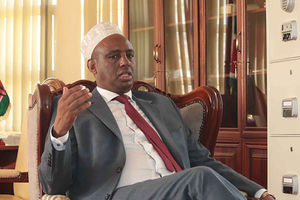
Governor Marsabit County Mohamud Ali before the Senate County Public Accounts at Bunge Tower in Nairobi on June 9, 2025.
Marsabit Governor Ali Mohamud was dramatically arrested from his home in April last year by the Ethics and Anti-Corruption Commission (EACC), but over a year later, he is still waiting to know his fate.
The county boss on Monday told a Senate Committee how the anti-corruption agency detectives dragged him to the EACC regional offices in Isiolo, over 200 kilometres away, only to tell him they would communicate later.
Over 14 months later, the EACC left the Governor wallowing in uncertainty even after presenting all the necessary documents.
This is despite making a spectacle of his arrest over claims of embezzling Sh8.2 billion from Marsabit County public coffers.
“The day I was invaded, I found it to be very crude. I am a law-abiding citizen. If they had just asked me to present myself, I would have complied,” Governor Mohamud told the Senate County Public Accounts Committee (CPAC).
“When they took me to Isiolo, over 200 kilometres from Marsabit, I was shocked to be told I would be called later.”
The Senate Committee has now summoned the EACC leadership over concerns that, despite being an independent institution, the anti-graft agency could be weaponised to settle political scores.
Appearing before the Senate, the EACC representative was at pains to inform the senators that the graft investigations against Governor Mohamud “are ongoing.”
“It is an active investigation at an advanced stage. Statements were recorded as early as last week,” stated the EACC officer, much to the chagrin of the legislators.
The Senators questioned why the EACC was taking unnecessarily long to conclude graft charges against the Marsabit Governor despite creating a public spectacle while arresting him without conclusive evidence.

Marsabit County Governor Mohamud Ali before the Senate committee on Energy at Bunge Tower, in Nairobi on May 8, 2025.
While terming his arrest by the EACC to be “very unfair and unprocedural, the exasperated county boss, the Committee led by Homabay County Senator Moses Kajwang that his arrest was politically motivated.
“I have no problem with the government of the day. The act of taking me to EACC was still political. Not from the government but from some quarters. I should be declared if I am guilty or not,” stated Mohamud.
“We have complained and provided all required documents. People will see me as someone who has taken public funds.”
The Senators questioned why the EACC was taking unnecessarily long to conclude graft charges against the Marsabit Governor despite creating a public spectacle while arresting him without conclusive evidence.
Weaponised to settle political scores
The legislators, led by the Committee Chair, expressed fears that the anti-graft agency, despite being an independent institution, could be weaponised to settle political scores.
“From our conversation, it seems like EACC could be weaponised. We have had cases in Trans Nzoia, Kiambu, Turkana and Isiolo,” stated Senator Kajwang, adding the agency leadership would be summoned to shed light.
Apart from Governor Mohamud, the Senators noted that several other governors are still struggling to clear their soiled reputation over graft allegations after the EACC raided their homes in full camera glare.
“We need to put timelines from the day you arrest someone. If you are not ready to prosecute, do not come to my house. If you do not arrest, then ask for 60 days to prosecute. It is an open abuse of the arrest process. I know they are coming for me next week, you're welcome,” stated Nairobi Senator Edwin Sifuna.
Isiolo Senator Fatuma Dullo stated that the corruption investigations had weighed on the Governor “for far too long” and they were even derailing the Office of the Auditor General.
“You cannot raid my house, then you put me there as a criminal for a whole year as you carry out an investigation. You cannot come here and defend EACC,” stated Senator Dullo.
Nyamira Senator Okong’o Omogeni argued that apart from being a clear case of abuse of the arrest process, the graft claims had a serious implication on the affected governor’s credibility locally and internationally.
“We are in the internet age. Once you raid a governor, whenever people search his name, they will see a corrupt governor,” stated Senator Omogeni.
According to the Senator, the law stipulates that before invading a person’s home, “you need to get the court’s authority, state the purpose of your raid and what you are going to do.”
“Getting warrants and raiding people’s homes is a clear abuse of power. The investigation has something to do with your reputation. Corruption is a serious claim.”
The Senator called for amending the law, acknowledging the need to have a balance between protecting the rights of the citizens and, at the same time, the investigative power of the Commission.
“If there is abuse, let us step in and amend it. I do not think it is to raid someone on April 4, 2024, and 14 months down the line, nobody has been taken to court.”
Kajwang pointed out that the EACC never never-ending investigation process has elicited scepticism over the Committee’s oversight role.
“The public does not understand why we keep making recommendations. It has been a very difficult journey to say our work is a recommendation.”







